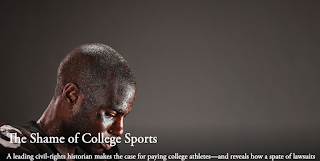Lit #2
Branch, Story by Taylor. “The Shame of College Sports.” The Atlantic, Atlantic Media Company, 30 Aug. 2019, www.theatlantic.com/magazine/archive/2011/10/the-shame-of-college-sports/308643/.
Key terms defined- student-athlete is the only term used in this article that I will use in my final paper
This article deals with the term student-athlete and all the implications that come with the term "student-athlete." Being that the NCAA adds the word "student" before "athlete" it saves them millions of dollars in compensation, especially when it comes to injuries. The term student-athlete was deliberately ambiguous. College players were not students at play (which might understate their athletic obligations), nor were they just athletes in college (which might imply they were professionals). That they were high-performance athletes meant they could be forgiven for not meeting the academic standards of their peers; that they were students meant they did not have to be compensated, ever, for anything more than the cost of their studies" (Branch). This term was purposely created to be very ambiguous, in that it takes the rights of these athletes to be treated as an "employee" even though they are making the colleges millions of dollars. One example that I plan on discussing is that of TCU running back Kent Waldrep, which I discussed in detail in my proposal, "Waldrep was paralyzed: he had lost all movement and feeling below his neck. After nine months of paying his medical bills, Texas Christian refused to pay any more, so the Waldrep family coped for years on dwindling charity" (Branch). Due to the term student-athlete, Kent Waldrep was not able to collect money for an injury that he would have been able to collect for, if and only if he paid taxes on his scholarship money. This article has tremendous value in my article in that it gives the foundation on how the NCAA has created a platform on purpose to exploit those who do not know any better. This is especially important being that "Approximately 1 percent of NCAA men’s basketball players and 2 percent of NCAA football players are drafted by NBA or NFL teams and just being drafted is no assurance of a successful professional career. Warning that the odds against professional athletic success are “astronomically high” (Branch). The NCAA knows that most of these athletes will not become professional and do not want to risk having to pay "workman's compensation" for the thousands of athletes who most likely will not be able to get a job. Most student-athletes devote their entire college career playing sports rather than focusing on an actual career and end up graduating with a meaningless degree. This connects to my Van Rheenen article on the education given to college athletes.
Taylor Branch is knowledgeable on this topic because he has written several articles/ books around the perverseness of the NCAA. He has also worked for several newspaper firms and worked as a lecturer in politics.
Key terms defined- student-athlete is the only term used in this article that I will use in my final paper
This article deals with the term student-athlete and all the implications that come with the term "student-athlete." Being that the NCAA adds the word "student" before "athlete" it saves them millions of dollars in compensation, especially when it comes to injuries. The term student-athlete was deliberately ambiguous. College players were not students at play (which might understate their athletic obligations), nor were they just athletes in college (which might imply they were professionals). That they were high-performance athletes meant they could be forgiven for not meeting the academic standards of their peers; that they were students meant they did not have to be compensated, ever, for anything more than the cost of their studies" (Branch). This term was purposely created to be very ambiguous, in that it takes the rights of these athletes to be treated as an "employee" even though they are making the colleges millions of dollars. One example that I plan on discussing is that of TCU running back Kent Waldrep, which I discussed in detail in my proposal, "Waldrep was paralyzed: he had lost all movement and feeling below his neck. After nine months of paying his medical bills, Texas Christian refused to pay any more, so the Waldrep family coped for years on dwindling charity" (Branch). Due to the term student-athlete, Kent Waldrep was not able to collect money for an injury that he would have been able to collect for, if and only if he paid taxes on his scholarship money. This article has tremendous value in my article in that it gives the foundation on how the NCAA has created a platform on purpose to exploit those who do not know any better. This is especially important being that "Approximately 1 percent of NCAA men’s basketball players and 2 percent of NCAA football players are drafted by NBA or NFL teams and just being drafted is no assurance of a successful professional career. Warning that the odds against professional athletic success are “astronomically high” (Branch). The NCAA knows that most of these athletes will not become professional and do not want to risk having to pay "workman's compensation" for the thousands of athletes who most likely will not be able to get a job. Most student-athletes devote their entire college career playing sports rather than focusing on an actual career and end up graduating with a meaningless degree. This connects to my Van Rheenen article on the education given to college athletes.
Taylor Branch is knowledgeable on this topic because he has written several articles/ books around the perverseness of the NCAA. He has also worked for several newspaper firms and worked as a lecturer in politics.

Comments
Post a Comment